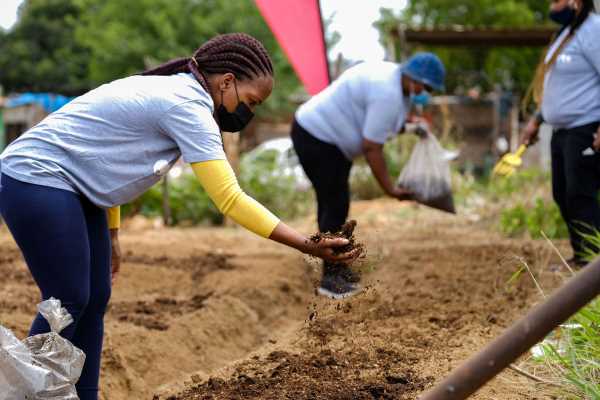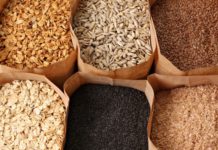Soil degradation remains a major factor causing Africa’s food insecurity and ecological instability. Overgrazing and unsustainable farming practices can rob the land of nutrients, drastically reducing annual production capacity.
The role of composting in stimulating microbial activity and improving soil structure is more important than ever in helping farmers turn the tide. This need is even more pronounced in urban regions where concrete jungles and overpopulation cause the ground to deteriorate faster.
The Loss of Urban Agricultural Land Is Dire
Just over ⅔ of Africa’s productive land is degraded, according to UN data. Similarly, desertification ravages around 45% of the total area while the landscape loses four million hectares of forest yearly.
Soil deterioration is also a key driver of climate change. As the ground structure breaks down from erosion and arid conditions, stored carbon is released into the atmosphere, contributing to greenhouse gas (GHG) emissions. Degraded land is also less resilient to extreme weather events, increasing vulnerability to flooding and droughts.
With degradation occurring up to 100 times quicker than the soil can replenish its nutrients, the resulting loss in crop yields has been immense. Unmitigated runoff across the region is also a leading cause of field waterlogging, further impeding plant growth. African farmers collectively stand to lose an estimated $68 billion from cultivating increasingly degenerated croplands.
Benefits of Composting in Urban Soil Restoration
The biochemical transformation of organic material into compost through microbial activity is key to addressing soil degradation in Africa. It’s also critical in minimising waste and fostering biodiversity, which are critical in the context of urban agriculture and ecosystem resilience.
Enhanced Soil Structure
Compost application can significantly improve soil texture bSy promoting aggregation and porosity. The resulting enhanced soil structure enhances aeration and water infiltration rates while mitigating compaction — a common challenge in urban environments where soils are often disturbed. Integrating compost into urban landscaping and agriculture improves the soil’s physical properties, fostering a conducive environment for plant growth.
Increased Soil Organic Matter
Well-cured organic compost naturally stabilises and enhances nitrogen levels and organic matter in the soil. This process enhances the root environment, improving vitality and accelerated growth rates, ultimately increasing crop yields. Its application also reduces the reliance on chemical fertilisers, which can lead to harmful runoff.
Improved Water Retention
Soils enriched with compost exhibit superior capacity for retaining moisture and oxygen. According to research, a mere 1% increase in organic matter can enable the soil to retain up to 20,000 gallons of water per acre. Besides being vital to plant growth and yield, this improved retention promotes water conservation — a critical component of urban revitalisation and sustainability.
Soil Fertility and Nutrient Cycling
Organic compost serves as a slow-release fertiliser, introducing vital microbes such as mycorrhizal fungi and nitrogen-fixing bacteria into the ground previously depleted by conventional farming practices and pesticides. Doing so enhances nutrient uptake in plant roots and resilience against pathogens.
Municipal Waste Management
Composting can considerably reduce the amount of waste ending up in landfills. Officials in the capital city of Addis Ababa are making great strides in leveraging composting to limit waste. However, there’s significant room for improvement, as less than 10% of city waste is composted. Still, it’s a step in the right direction, potentially defining Ethiopia’s future of urban agriculture.
Economic Viability
Composting can significantly reduce input costs, particularly in economically challenged urban regions. Utilising readily available organic waste means farmers can produce their own nutrient-rich plant food, decreasing dependence on expensive chemical options. This approach is particularly notable in cities with high populations of smallholder farmers. For example, in Maputo, Mozambique, community composting initiatives empower local farmers to enhance soil fertility sustainably.
Composting and Sustainable Urban Development
Applying organic matter is a proven way to improve the soil structure, enhancing carbon sequestration. Such a solution could go a long way in restoring urban land and minimising GHG emissions.
That said, composting is not without criticism, particularly regarding organic matter decomposition, which releases GHGs into the atmosphere and increases disease risk. The process may also be slow, often necessitating reliance on chemical fertilisers to meet rapidly growing food demand.
Regardless, the benefits of composting are plain to see, as evidenced by the spate of renewed interest in the project. Subsequent developments must focus on introducing advanced processing facilities across cities and incentivising farmers to adopt the practice.
The Growing Popularity of Africa’s Urban Soil Composting
As cities expand, urbanisation and food insecurity intensify, prompting governments and individuals to invest in sustainable composting solutions. This trend is growing fast across the continent with promising results.
In Nairobi, Norwegian Investment Fund Norfund has funded projects developing organic fertilisers and composting to drive a more circular economy. These programmes have been highly successful, upcycling 60,000 tons of waste and cutting 50,000 tons of carbon emissions. Such initiatives improve urban soil health, enabling residents to cultivate vegetables and fruits in community gardens.
In the Benin Republic, farmers compost unused organic waste from households and crops to address chemical-induced soil infertility and expand access to agricultural facilities. The region has endured drought and flooding, threatening the food supply in most urban areas. Composting improves the soil’s water-holding and filtration capacity to withstand these climate change impacts better.
Revitalise Africa’s Degraded Urban Land
Composting is a transformative practice for urban land restoration in Africa, providing a sustainable alternative to chemical fertilisers while enhancing soil health and resilience. The multifaceted benefits of composting underscore its critical role in addressing the challenges of urbanisation and climate change. With the right investment and policies, composting practices could become a new standard for ensuring food security for growing populations.








